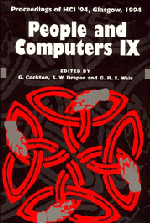Book contents
- Frontmatter
- Contents
- Preface: HCI'94 – You Probably Haven't Seen It All Before
- Part I Invited Papers
- Part II Methodology of Interactive Systems Development
- Crafting Interaction: Styles, Metaphors, Modalities and Agents
- 10 A Comparison of Placement Strategies for Effective Visual Design
- 11 Evaluation of Alternative Operations for Browsing Hypertext
- 12 On the Problem of Selecting Interaction Objects
- 13 Minimising Conceptual Baggage: Making Choices about Metaphor
- 14 Keeping an Eye on your Interface: The Potential for Eye-Based Control of Graphical User Interfaces (GUI's)
- 15 A Linguistic Approach to Sign Language Synthesis
- 16 Generalisation and the Adaptive Interface
- 17 Agent-Based Interaction
- Modelling Humans, Computers and their Interaction
- Notations and Tools for Design
- Part VI Computer-Supported Cooperative Work
- Author Index
- Keyword Index
16 - Generalisation and the Adaptive Interface
Published online by Cambridge University Press: 04 August 2010
- Frontmatter
- Contents
- Preface: HCI'94 – You Probably Haven't Seen It All Before
- Part I Invited Papers
- Part II Methodology of Interactive Systems Development
- Crafting Interaction: Styles, Metaphors, Modalities and Agents
- 10 A Comparison of Placement Strategies for Effective Visual Design
- 11 Evaluation of Alternative Operations for Browsing Hypertext
- 12 On the Problem of Selecting Interaction Objects
- 13 Minimising Conceptual Baggage: Making Choices about Metaphor
- 14 Keeping an Eye on your Interface: The Potential for Eye-Based Control of Graphical User Interfaces (GUI's)
- 15 A Linguistic Approach to Sign Language Synthesis
- 16 Generalisation and the Adaptive Interface
- 17 Agent-Based Interaction
- Modelling Humans, Computers and their Interaction
- Notations and Tools for Design
- Part VI Computer-Supported Cooperative Work
- Author Index
- Keyword Index
Summary
Automated macro systems which apply re-use to a user's input are a possible solution to the problems of customising an interactive system to the needs of the user. More useful than simple re-use would be a system that makes use of general patterns in users' behaviour and encapsulates this knowledge for application in similar, yet unfamiliar, circumstances. This process we term generalisation. This paper outlines some issues involved in controlling generalisation and the presentation and interaction with these macros, and specifies applicable heuristics. Finally the architecture for building an adaptive agent to perform the whole process is presented, with an example prototype operating on UNIX command-line interaction.
Keywords: adaptive interfaces, interface customisation, interface transformation, command reuse, agent modelling, initiative.
Introduction
One example of demonstrational interfaces (Myers, 1991) — automated macro creation — has been shown to be a promising area for adaptive system research previously by Greenberg (1990) and Crow & Smith (1992). Crow & Smith have extended the simple re-use of previous command entries (the history/tool-based systems of Greenberg) from a single line to an inferred macro. Macros are a concept that users are already familiar with for automation.
Re-use, however, is limited to situations corresponding exactly to those which have occurred before. Whilst it has been shown that these situations happen reasonably frequently (Greenberg & Witten, 1993a; Greenberg & Witten, 1993b) for single line re-use (a result which has not been investigated for multi-line re-use), both single-line and multi-line macro re-use break down in situations which differ slightly from the original. In both cases the re-use system is of no help.
- Type
- Chapter
- Information
- People and Computers , pp. 223 - 238Publisher: Cambridge University PressPrint publication year: 1994
- 1
- Cited by



